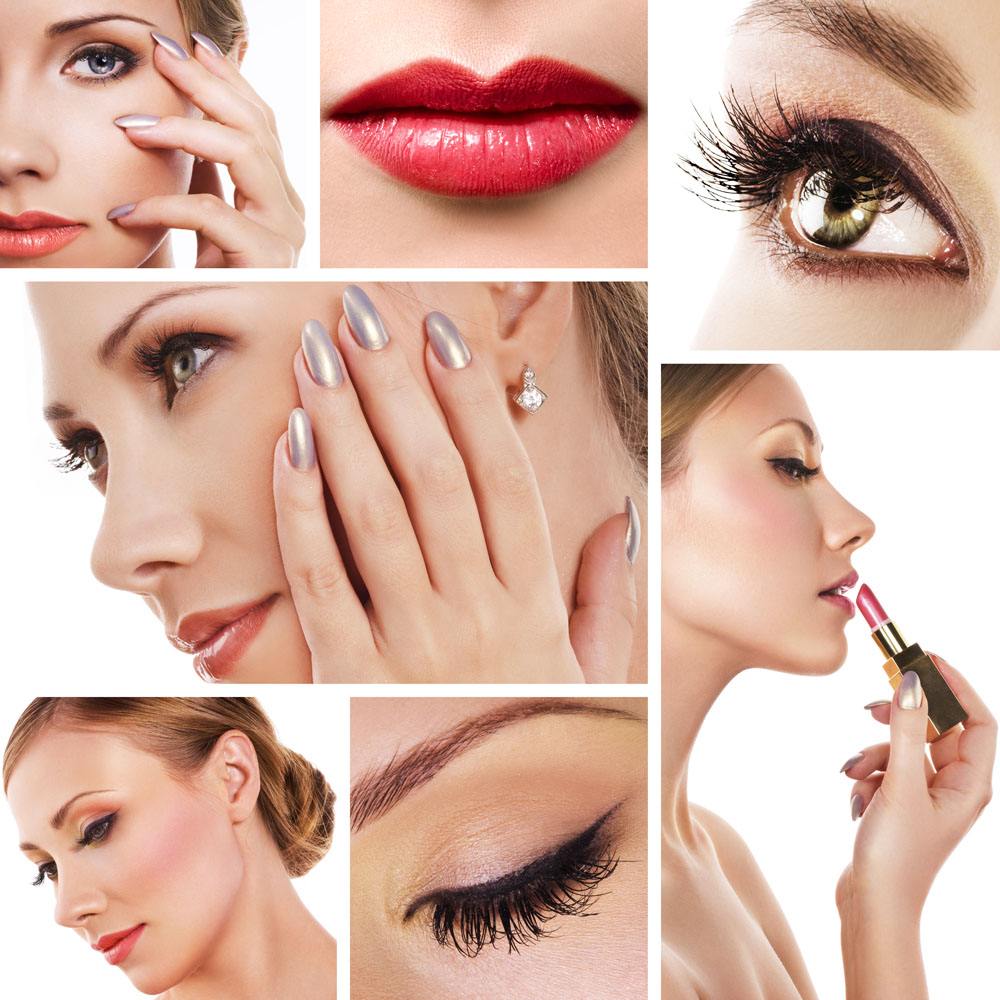(单词翻译:单击)
情景对话
Katie: So what do you think is a good age for girls to start wearing make-up?
凯蒂:你认为女孩从多大开始化妆合适?
Aimee: I think it depends on the kind of make-up that they're wearing and the purpose, you know, because to me, it seems like there are two different kinds. You know, there are young children, young girls, young children, who wear play make-up, you know.
艾米:我认为这取决于她们化的是哪种妆以及她们化妆的目的,对我来说,这是两种不同的情况。现在有些年轻女孩也会化妆。
Katie: Yeah.
凯蒂:对。
Aimee: It's a toy. It washes off easily, garish colors, very mild on the skin, and you know, it's literally just coloring in their face. It's not, you know, enhancing their features or trying to look as society thinks beautiful, you know. They're not covering up any pimples or spots, you know. It's not like that. It's just coloring in their face, trying to look more like a princess. And I have a six-year old daughter and she loves make-up. She has her own, like, young like toy make-up and she asks permission to wear it, and I let her wear it. I bought some for her. I make sure that she can only do it if she has a clean face and clean hands and that she washes off properly at the end. And that she tidies it away afterwards.
艾米:那是玩具。可以轻易地洗掉,虽然颜色艳丽,不过对皮肤刺激性不强,可以说就是在脸上涂了些颜色。你知道,那并不能提升你的容貌或是让其他人认为你很漂亮。那不能遮盖青春痘或粉刺。没有那种功效。那只是在脸上涂了颜色,试图让你看上去更像公主。我女儿今年6岁,她喜欢化妆。她有自己的玩具化妆盒,她要得到允许才能化妆,我允许她化妆。我给她买了那个化妆盒。我要确保她只有在脸和手都干净的情况下才能化妆,她最后会洗掉。随后她会把脸洗干净。
Katie: That was good.
凯蒂:那很好。
Aimee: She's actually on her final warning because she used to leave it out – and I've warned her I will throw it in the bin. Because I have a toddler and she wants to see what her big sister is doing and she wants to play with it, so she grabs it and makes a mess everywhere. So yeah, six-year old is on her final warning. So I guess to answer your question, my six-year old is wearing her play make-up already. So it doesn't, yeah, it doesn't bother me. Young is –
艾米:她经常被警告,因为她总是把东西乱放,我警告她,我会把它们扔进垃圾桶。因为我还有一个刚学会走路的孩子,她想看看姐姐在干什么,她也想玩那些东西,所以她会伸手去抓,弄得一片狼籍。所以,6岁的孩子经常被警告。我想这可以回答你的问题,我6岁的女儿已经在玩化妆游戏了。我对此并不感到困扰。
Katie: How old were you when you started wearing make-up?
凯蒂:你多大开始化妆的?
Aimee: Well, I love make-up, and that's probably where my daughter got it from. I wanted to wear make-up from a young age, the way my daughter does. I wasn't allowed. It was forbidden. And I first actually managed to buy a secret lipstick when I was about 9 or 10.
艾米:嗯,我喜欢化妆,可能我女儿就是从我这里遗传的。我很小就想化妆了,就像我女儿那样。不过家长不允许我那样做。他们禁止我化妆。我第一次偷偷地买口红是在我9岁或10岁的时候。
Katie: Secret lipstick.
凯蒂:秘密口红。
Aimee: Yeah. I had to hide it from my mom, and she would only let me wear lip gloss when I was that age, and I wasn't allowed to wear any lip sticks. I had to buy a secret one. And I was always so interested in my grandmother's make-up and my mom's make-up as well. But she never really wore much. She has a very simple sort of beauty routine. I'm much more interested in it than she is – she ever was. So I don't know where I inherited that from but my daughter has definitely inherited that from me. So maybe because it was forbidden for me that's why I was drawn to it more.
艾米:对。因为我必须把它藏起来,不让我妈妈发现,那个年纪我妈妈只让我涂唇膏,不让我涂口红。所以我不得不买了之后藏起来。我一直对我奶奶和我妈妈的化妆品很感兴趣。不过我妈妈不怎么化妆。她的日常美容护理非常简单。我对化妆的兴趣远超过她。我也不知道这种兴趣是从哪儿遗传来的,不过我女儿肯定是遗传自我。也许因为我妈妈不让我化妆,所以我才更感兴趣。
Katie: Makes it more tantalizing.
凯蒂:那使化妆更具吸引力。
Aimee: I think so. That could be it, but yeah, it's a real hobby for me. I really, really love it. I wish I had more money to purchase more. You can never have enough.
艾米:我想是这样的。可能是这样,化妆是我真正的兴趣。我真的非常喜欢化妆。我希望我能有更多钱买化妆品。因为你永远觉得自己的化妆品不够。
Katie: You can never have too many lipsticks.
凯蒂:有再多口红都不嫌多。
Aimee: I know. It's true.
艾米:对,没错。
Katie: What do you think about boys wearing make-up?
凯蒂:你怎么看男生化妆?
Aimee: If they want to wear make-up, then they should. Like it annoys me this horrible idea and concept of like men and boys have to be manly like what is manly? For me, make-up is an art. It really is. It's artistry. And, you know, if they want it, if they're feeling bad about their skin the way I feel bad about my skin, right. If I have pimples or spots, I'm lucky. I get to just cover up with like foundation and concealer, a bit of blusher. It makes me feel better. But, you know, if there's like a boy who has, you know, going through teenage years and he's got bad skin and he wants to cover up, and his macho friends catch him wearing it or whatever people in school catch him wearing it and it can be a really bad situation for him. And I think that is awful. It is really, really terrible. I think boys should wear make-up as they like. I actually follow quite a lot of make-up artists on social media. And I look at many, many pictures of different products and the art that they produce, and I follow male make-up artists as well. And the skills they have are unbelievable, honestly. The blending skills.
艾米:如果他们想化妆,那他们就可以化。“男性或男孩必须像男子汉一样”这种可怕的想法令我很反感,什么是男子气概?我认为,化妆是种艺术。真的是艺术。化妆具有艺术性。如果他们想化妆,如果他们对自己皮肤的情况感到难受,就像我一样,那他们可以化妆。如果我长了痘或是粉刺,我很幸运,我能用粉底和遮瑕豪遮住,再涂点腮红,那会让我感觉好些。但是,如果正在经历青春期的男孩皮肤不好,他想遮住,他那些充满阳刚的朋友看到他化妆或是学校里其他的人看到他化妆,那会使他陷入非常糟的处境中。我认为那太可怕了。那真的非常可怕。我认为如果男孩喜欢,那他们也应该化妆。我在社交媒体上关注了很多化妆师。我看了他们上传的很多产品的图片,还有他们创造的艺术,我关注的化妆师中也有男性。说实话,他们的化妆技巧非常不可思议。他们拥有完美的技巧。
Katie: Their contouring.
凯蒂:他们的轮廓。
Aimee: Yeah.
艾米:对。
Katie: Oh my goodness.
凯蒂:哦,我的天哪。
Aimee: The blending skills and like covering up, you know, basically just like covering up their whole face and putting a new face on top of it.
艾米:完美的技巧,就像易容一样,他们把整张脸都遮住了,然后用化妆创造了一张新的面孔。
Katie: It's pretty impressive.
凯蒂:那的确令人印象深刻。
Aimee: It's really impressive. It's so amazing. I would really enjoy a make-up lesson from some of the artists that I follow on different social media sites.
艾米:印象非常深刻。那太不可思议了。我非常喜欢我在社交媒体上关注的一些化妆师教授的课程。
Katie: Absolutely.
凯蒂:那是一定的。

译文属可可原创,仅供学习交流使用,未经许可请勿转载
重点讲解
重点讲解:
1. depend on 取决(于);有赖(于);
例句:What happened later would depend on his talk with De Solina.
日后之事将有赖于他与德索利纳的谈话结果。
2. cover up (用…)盖在…上(以保护或隐藏);
例句:Cosmetics do not cover up the deficiencies of nature.
化妆品并不能掩盖先天缺陷。
3. be interested in 感兴趣的;有兴趣的;关心的;
例句:As a writer I am interested in characterization.
作为作家,我对人物塑造感兴趣。
4. go through 经历,经受(尤指苦难或艰难时期);
例句:Most kids will go through a phase of being faddy about what they eat.
大多数孩子都会经历挑食的阶段。


